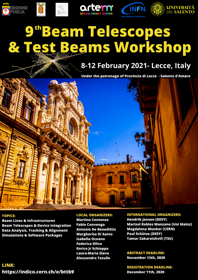Speaker
Description
Future particle physics experiments are motivated by the increase in luminosity and thus the need for intelligent tracking detectors providing fast track and momentum information to select events of interest. The next generation tracking detectors are mostly all silicon detectors and thus finding a cost effective solution to maximise the output is important.
A recent R&D project is using CMOS technology for silicon strip sensors, which allows large and high-resistive wafers at low cost, making them a prime candidate. Also since CMOS is commercially fabricated process it provides the advantage of easier production and faster fabrication.
In this contribution, the first test beam measurements at DESY test beam facilities of novel passive CMOS silicon strip sensors developed by the ATLAS Collaboration are presented. The sensor is processed by LFoundry, employing a 150 nm CMOS technology and has three different strips design to study. The strip sensors are designed in two different lengths, formed by stitching of individual reticles. The main focus of this test beam measurement is to study the charge collection by the sensor, sensor hit detection efficiency and examine the performance of the stitching.
